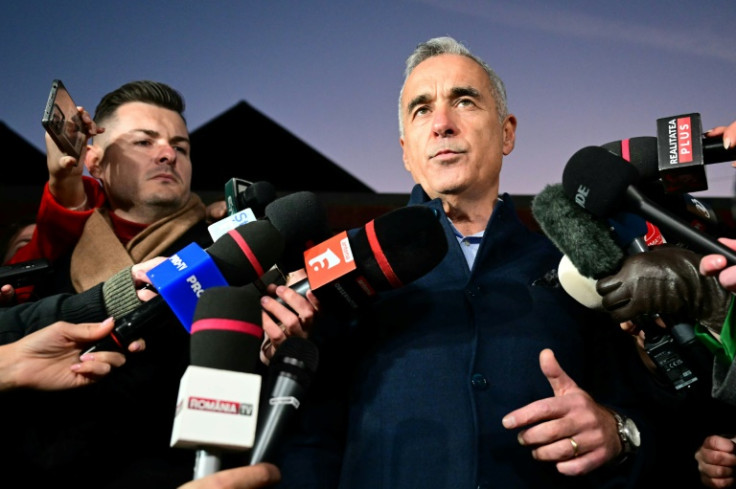
Barely known a year ago, far-right candidate Calin Georgescu successfully dominated social network TikTok to emerge the shock winner of Romania's first-round presidential election -- an online campaign that has raised suspicions.
Georgescu, an admirer of Russian President Vladimir Putin, has surged to more than 450,000 followers on TikTok, racking up millions of views and five million likes in the country of 19 million people.
Romanian news site G4 Media, which conducted an analysis of Georgescu's social media use, found the far-right politician mounted a "propaganda machine" using thousands of supposed "volunteers" to spread his anti-EU, anti-NATO messages.
It found his online allies received pre-made materials on messaging app Telegram, ready for posting as comments on TikTok and other platforms, where Georgescu produced a wave of viral content around issues such as his call for an end to aid for neighbouring Ukraine.
Georgescu, 62, finished as the surprise winner of Sunday's first-round election, knocking out incumbent Prime Minister Marcel Ciolacu to reach a runoff against pro-European centrist Elena Lasconi on December 8.
Social media played an outsize role in his shock surge, especially on TikTok, where he became ubiquitous.
"I have seen football TikToks with comments (saying), 'Vote for Calin Georgescu,'" said 21-year-old voter Catalin Olaru.
Andrei Curararu, co-founder of the Moldova-based think tank Watchdog.md, said Georgescu managed his first-round success by drawing protest votes driven by economic grievances, framing himself as a "father figure" offering quick solutions that resonated deeply.
TikTok played "a decisive role", Curararu said: Georgescu's campaign videos reached more than 52 million views in just four days, mobilising younger voters.
"It is clear he would not have this tactical win without the influence he gained on TikTok," Curararu told AFP -- though he added that the platform also amplifies counter-narratives, showing how it can deepen societal divisions.
Curararu said several influencers who boosted Georgescu's campaign on TikTok had publicly admitted to being paid for their involvement.
"This directly contradicts Georgescu's claim that he spent 'zero' on his campaign," he said.
Several major accounts that supported Georgescu or had names similar to his official account have recently deleted videos, sometimes going so far as to completely empty their history, AFP Factcheck found.
The European Commission said it would hold a roundtable Friday with the Romanian authorities and TikTok.
"This is a common practice that we tend to do under the Digital Services Act because free and fair elections are at the core of our democracies," said Commission spokesman Thomas Regnier.
A top Romanian security body, the Supreme Council of National Defence, said Thursday that TikTok had given Georgescu "preferential treatment" leading to his "massive exposure", without mentioning the far-right candidate by name.
TikTok rejected accusations of helping Georgescu.
"It is categorically false to claim that his account was treated differently from those of other candidates," a spokesperson told AFP.
He "was subject to exactly the same rules and restrictions" as all the other candidates, the company said.
Curararu said Georgescu's campaign recalled the use of organised Telegram groups in Moldova's recent presidential election, where pro-European incumbent Maia Sandu was reelected after a tense vote overshadowed by allegations of Russian meddling.
"In Moldova, we saw a blatant vote-buying operation with over 138,000 accounts set up in a Russian bank, complete with territorial organisations, Telegram authentication, call centres for legal support and even 'quality control' calls from Moscow to ensure the operation ran smoothly," he said.
"It was a machine built to undermine democracy. Georgescu's campaign mirrors this playbook."
Curararu said Georgescu's campaign had used a series of copy-paste narratives, such as "neutrality", "sovereignty", and slashing support for Ukraine.
"Let's be honest -- this is nothing more than pro-Russian messaging dressed up as patriotism," he said.
In Bucharest, some voters insisted they were not influenced by social media.
"In no way was I influenced by TikTok. I voted for Georgescu because he is a family guy," said Carmen Ioan, 46, who works at a flower shop.







